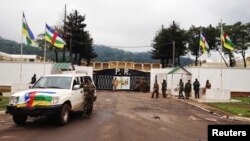UNITED NATIONS —
Human Rights Watch is calling on the U.N. Security Council to sanction leaders of the Central African Republic’s Seleka coalition. The group seized power in March and killed and raped civilians, burned villages and looted property as it took control of the country’s provinces.
HRW says the Central African Republic has become a forgotten crisis. With the launch Wednesday of its new report on the situation there, the New York-based group urges the international community to urgently address the situation.
The group conducted field research from April to June, documenting cases of human rights abuses and identifying patterns of violence committed by Seleka. HRW also obtained satellite imagery confirming the destruction of villages.
Lewis Mudge is the report’s author. He made several trips to the country, where he found hundreds of homes destroyed by Seleka and heard witness accounts of abuses.
“In this case, the Seleka actually made my job quite easy," he said. "When I met with Seleka leaders outside of the capital, they were quite honest and open with me about how they had burned villages and how they had targeted civilians. They looked me in the eye and they said to my face, ‘Yes, this was us.’”
Mudge said this highlights the impunity with which Seleka operates. He noted they do not have the support of the population, which lives in fear of them.
While the report focuses on abuses committed by Seleka, it does recount some severe violations of detainees by security agents working for former president François Bozizé. The president was overthrown by Seleka in March.
The report makes numerous recommendations, including that the CAR government stop tolerating attacks on civilians, investigate abuses and start holding perpetrators accountable.
Mudge said the Security Council also must act, before the country descends into complete chaos.
“Currently the Seleka leaders are operating under the assumption there is no threat because nobody is paying attention. But we do feel the Security Council could do something about this," he said. "They could put certain Seleka leaders who are found to be committing human rights abuses on the sanctions list. It will send a strong message to the Seleka that the world is starting to pay attention and that the world is watching.”
United Nations humanitarian and human rights officials have been warning about the CAR’s instability for months. They say that while security in the capital, Bangui, has improved, in the rest of the country the state is almost non-existent. The humanitarian crisis is growing and insecurity threatens to spread beyond the country’s borders.
African countries have sent more than 1,000 peacekeepers to the Central African Republic to protect civilians. That number is expected to grow to more than 3,500 under African Union auspices.
HRW says the Central African Republic has become a forgotten crisis. With the launch Wednesday of its new report on the situation there, the New York-based group urges the international community to urgently address the situation.
The group conducted field research from April to June, documenting cases of human rights abuses and identifying patterns of violence committed by Seleka. HRW also obtained satellite imagery confirming the destruction of villages.
Lewis Mudge is the report’s author. He made several trips to the country, where he found hundreds of homes destroyed by Seleka and heard witness accounts of abuses.
“In this case, the Seleka actually made my job quite easy," he said. "When I met with Seleka leaders outside of the capital, they were quite honest and open with me about how they had burned villages and how they had targeted civilians. They looked me in the eye and they said to my face, ‘Yes, this was us.’”
Mudge said this highlights the impunity with which Seleka operates. He noted they do not have the support of the population, which lives in fear of them.
While the report focuses on abuses committed by Seleka, it does recount some severe violations of detainees by security agents working for former president François Bozizé. The president was overthrown by Seleka in March.
The report makes numerous recommendations, including that the CAR government stop tolerating attacks on civilians, investigate abuses and start holding perpetrators accountable.
Mudge said the Security Council also must act, before the country descends into complete chaos.
“Currently the Seleka leaders are operating under the assumption there is no threat because nobody is paying attention. But we do feel the Security Council could do something about this," he said. "They could put certain Seleka leaders who are found to be committing human rights abuses on the sanctions list. It will send a strong message to the Seleka that the world is starting to pay attention and that the world is watching.”
United Nations humanitarian and human rights officials have been warning about the CAR’s instability for months. They say that while security in the capital, Bangui, has improved, in the rest of the country the state is almost non-existent. The humanitarian crisis is growing and insecurity threatens to spread beyond the country’s borders.
African countries have sent more than 1,000 peacekeepers to the Central African Republic to protect civilians. That number is expected to grow to more than 3,500 under African Union auspices.




